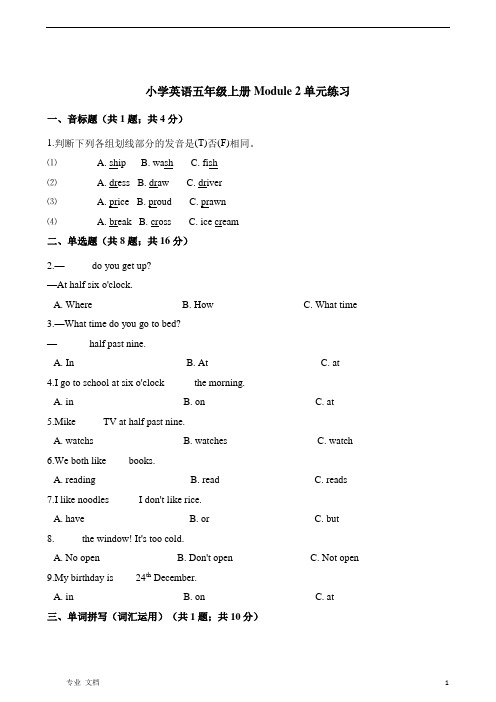牛津上海版五年级英语上册Module2RelationshipsUnit4Grandparents教案
- 格式:pdf
- 大小:322.34 KB
- 文档页数:2



Module 2 RelationshipsUnit 4 Grandparents教学设计1教学目标1、帮助学生掌握频度表达法。
2、帮助学生描述自己的习惯。
教学重难点1、在日常对话与交流中能正确理解和运用频度副词。
2、能区分不同副词的频度并正确运用。
教学流程Pre-task preparations:1. T: Show students some pictures of leisure activity.T: Do you like playing football?S1: Yes, I do.T: When do you play football?S1: I play football on Saturday afternoon.T: Who do you play with?T: I play with my friends.2. Write some activities on the blackboard. Ask the students how often do they do the activities?While-task procedure1.Teach the words: always, often, sometimes教师根据上面活动的表格,作出总结。
列出Look and learn 中的频度副词,并在相应的单词后放上数量不同的星星,依次为always, usually, often, sometimes, never. never后不放星星。
2.介绍自己的生活习惯,让学生进一步理解频度副词。
T: I’m a teacher. I always get up at half past six. I usually leave home at seven o’clock. I always eat lunch at school. I usually go home at half past six. I sometimes go to the supermarket after work. I often cook dinner for my family. Sometimes I eat at a restaurant.Ask students some questions about my daily life.1)Do I get up at six every day?2)Do I go home at half past six every day?3)Do I go to the supermarket every day?4)Do I cook for my family every day?3.学生抽取写有频度副词及星期的卡片,根据所抽到的卡片组成问句,然后互相问答。


小学英语五年级上册Module 2单元练习一、音标题(共1题;共4分)1.判断下列各组划线部分的发音是(T)否(F)相同。
⑴________A. ship B. wash C. fish⑵________A. dress B. draw C. driver⑶________A. price B. proud C. prawn⑷________A. break B. cross C. ice cream二、单选题(共8题;共16分)2.—_____ do you get up?—At half six o'clock.A. WhereB. HowC. What time3.—What time do you go to bed?—______ half past nine.A. InB. AtC. at4.I go to school at six o'clock _____ the morning.A. inB. onC. at5.Mike _____TV at half past nine.A. watchsB. watchesC. watch6.We both like ____books.A. readingB. readC. reads7.I like noodles _____ I don't like rice.A. haveB. orC. but8._____ the window! It's too cold.A. No openB. Don't openC. Not open9.My birthday is ____24th December.A. inB. onC. at三、单词拼写(词汇运用)(共1题;共10分)10.按要求写单词。
⑴same(反义词)________ ⑵come(反义词)________ ⑶one(序数词)________ ⑷eighth(基数词)________ ⑸make(现在分词)________ ⑹swim(现在分词)________ ⑺sing(名词)________ ⑻drive(名词)________⑼party(复数)________ ⑽meat(同音词)________四、选词填空(词汇运用)(共6题;共6分)11.We can ________(meet /meeting)at three o'clock in the park.12.She often ________(ride /rides)bikes in the park.13.Look, Joe is ________(singing /sing)songs in the room.14.I'd like some ________(tomato / tomatoes).15.Here ________(is / are)a birthday cake for you!16.Let's go ________(shopping / shop)together.五、补全对话(共1题;共5分)17.从所给出的句子中选出合适的完成对话。

听录音,选出你所听到的单词。
(_____)1. A. clever B. class C. cross(_____)2. A. book B. bored C. before (_____)3. A. light B. night C. white (_____)4. A. easy B. say C. heavy (_____)5. A. what B. watch C. water 【答案】A B A C B【解析】1.clever2.bored3.light4.heavy5.watch听录音,给下列图片排序。
(_____)(_____)(_____)(_____)(_____)【答案】4 5 1 2 3【解析】1. W: I’m doing my homework.2. W: I’m in my bedroom.3. M: Look, my brother is in the living room. He is watching TV.4. M: I like playing football.5. W: She is making phone calls to invite her friends to come to her birthday party.听录音,选出合适的答语。
(_____)1. A. We are in the same class. B. We usually play chess.(_____)2. A. I’m in my bedroom. B. I’m playing the guitar.(_____)3. A. Yes, I do. B. Yes, I can.(_____)4. A. No, I’m in the bathroom. B. No, I’m running.【答案】B A A A【解析】1. M: What do you usually do with your sister?2. W: Where are you?3. M: Do you often play chess with your grandparents?4. W: Are you in the kitchen?5. M: Who is your good friend?听录音,选出与所听内容相符的图片。
牛津深圳版五年级上册Module 2 Relationships测试题听力部分(40分)一. 听录音,选出你所听句子中含有的单词。
(10分)()1. A. hungry B. full C. thirsty()2. A. face B. dinner C. school()3. A. meat B. rice C. bread()4. A. morning B. night C. evening()5. A. carrot B. cabbage C. tomatoes二. 听录音,根据所听的单词或短语选择正确的图片。
(10分)A B C D EF G H I J1 2 3 4 5 6 7 8 9 10三. 选出你所听到的句子。
(10分)()1. A. I like bread. B. I like meat.C. I like tomatoes.()2. A. I don’t like red. B. I don’t like green.C. I don’t like white.()3. A. Are you hungry? B. Are you angry?C. Are you thirsty?()4. A. What do you like? B. What does your sister like?C. What don’t you like?()5. A. I’m writing a letter. B. I’m writing an email.C. I’m writing your name.四. 听录音,选出所听问句的恰当答语。
(10分)()1. A. Yes, I am. B. No, I don’t.C. Sure.()2. A. At eight o’clock. B. Eight o’clock.C. It’s eight o’clock.()3. A. Red. B. An egg.C. Eggs.()4. A. They are my parents. B. He is my brother.C. She is sister.()5. A. By bike. B. It’s Monday.C. At the weekend.笔试部分(60分)一. 按要求写单词。
Relationships摸底测一、英汉互译play chess ____________ write an e-mail to Tom_______ far from school_________ 在周末____________play sport with parents____________ fall down___________在公交车站碰头__________ 在厨房____________在同一个班____________ like each other____________过马路____________ make phone calls____________做晚饭____________ in the bathroom____________ turn off the light____________ 讲故事____________二、选出正确选项()1. Please come and help me _____my English.A. ofB. inC. with()2. Hello, is that Wang Bing?_____.A. Yes, this is Wang Bing.B. Yes, I am.C. Yes. I’m Wang Bing.()3.What can you do, Sally? I can _____a bike.A. ride.B. ride onC. riding on.()4. Betty is _________the picture in the study.A. looking at.B. look atC. watching at ()5. James _____ goes to play volley ball, so he plays volleyball very well.A. neverB. sometimesC. often()6. Grandparents’ Day is ___ a Sunday ___ September.A. on, atB. in, in C: on, in ( ) 7. The Children’s Day is a festival ____ children.A.toB. forC. with【参考答案】一、英汉互译下国际象棋写邮件给汤姆离学校远在周末和父母做运动落下meet at the bus stop In the kitchen in the same class 喜欢对方 cross the street 打电话 cook dinner 在浴室关灯 tell a story二、选出正确选项 CAAACCB情景导入Do you live with your grandparents?What do you usually do with your grandparents?学习目标1. To review some words、phrases and basic grammar in this module.2. To review how to use these words and phrases.3. Attract students’ interest to English learning.重点难点1.New words, sounds, Grammar.知识梳理1. usually /ˈjuːʒuəli / adv. 通常【即学即练】1. We ________ (usual) have six classes every day.2. She always gets up early and is seldom late. (同义词)A. oftenB. alwaysC. sometimesD. not often【参考答案】1. usually 2. D2. visit / visit / v. 拜访,参观We visit our grandparents. I want to visit the museum.【即学即练】翻译下列句子:1.明天我们将去拜访老师。